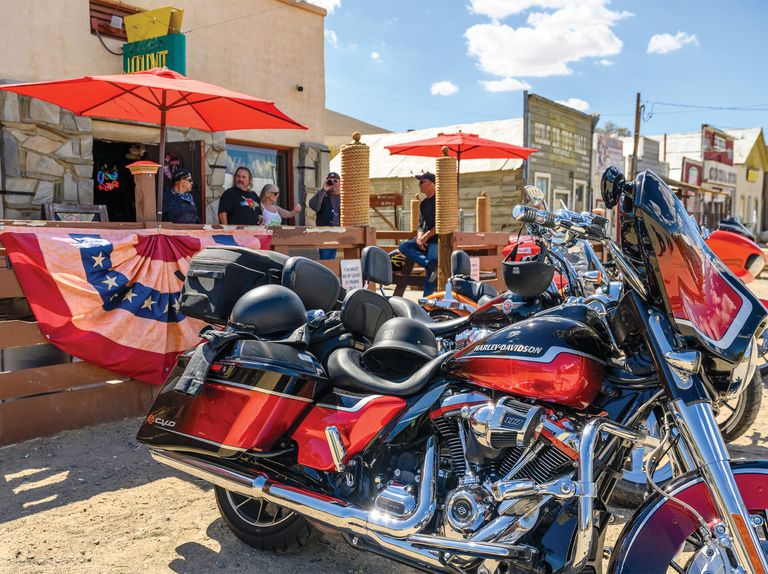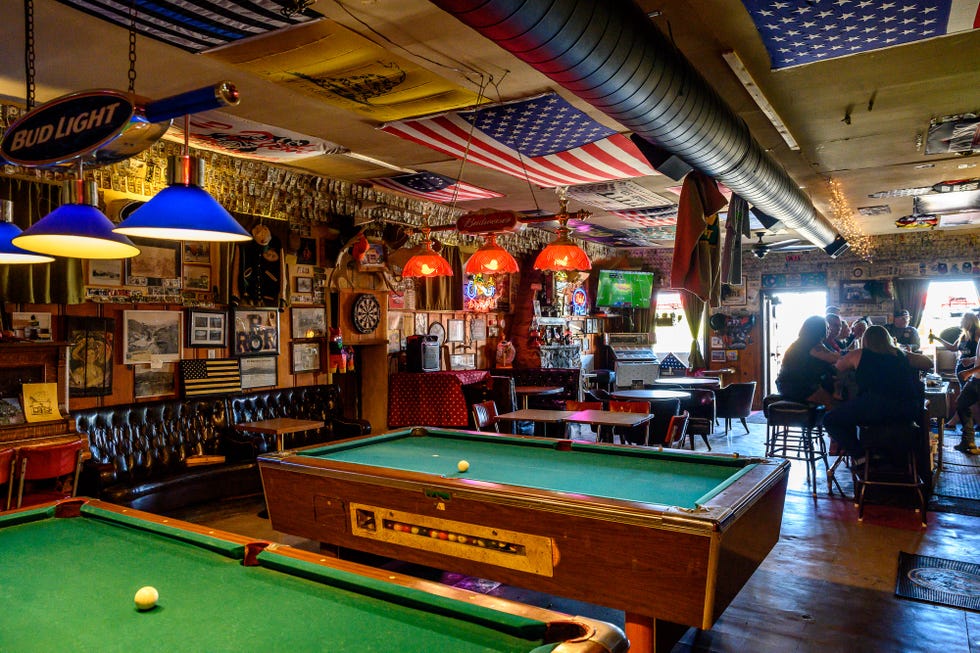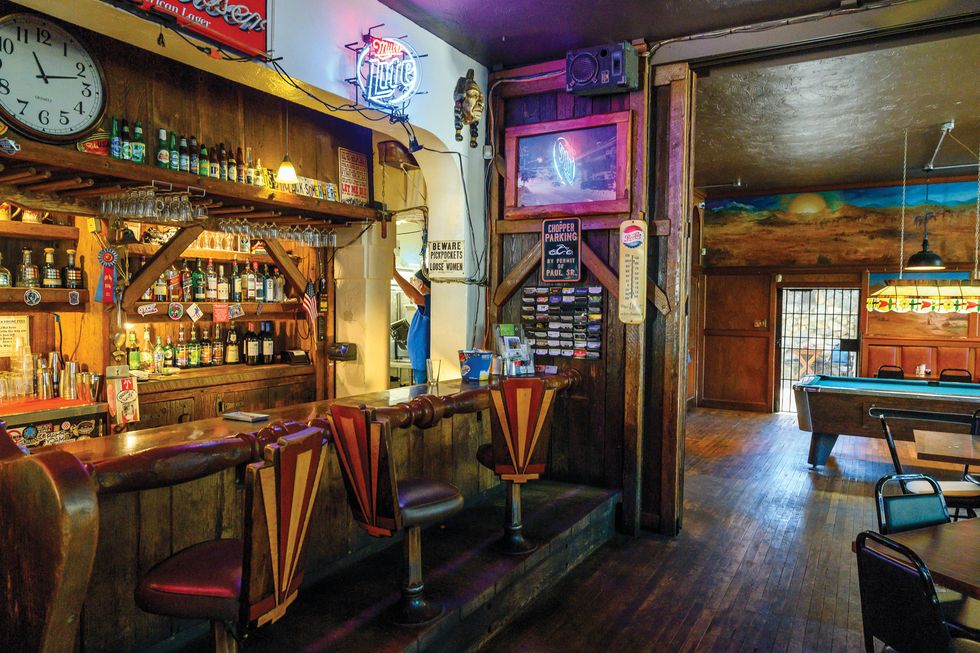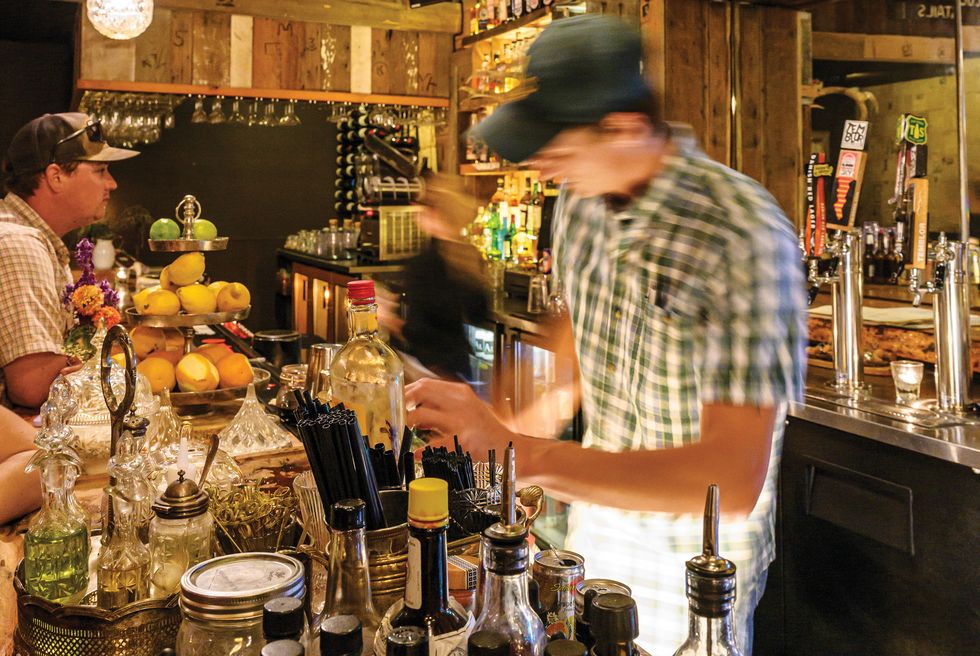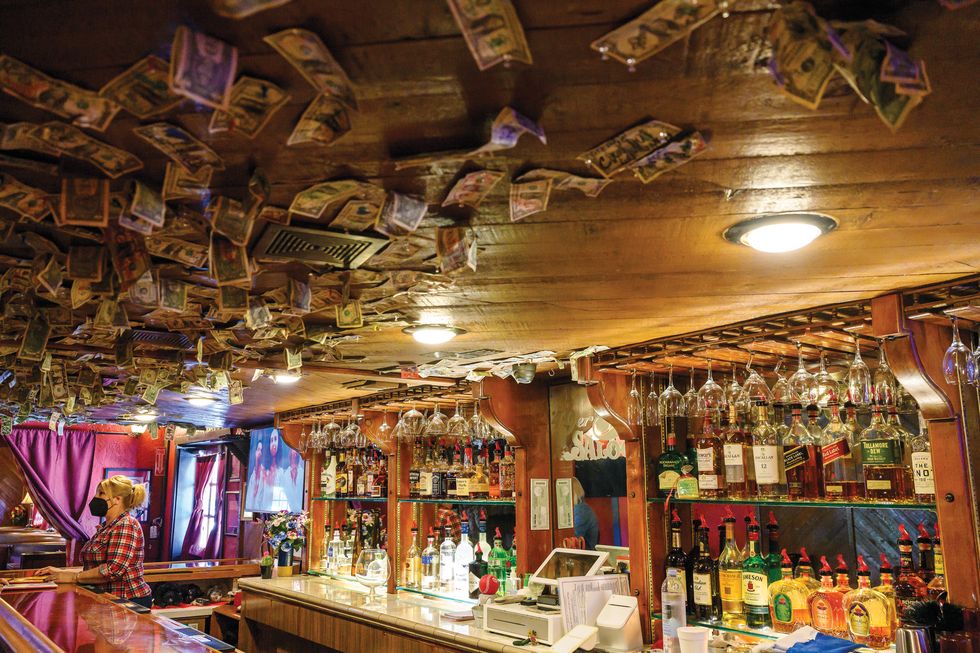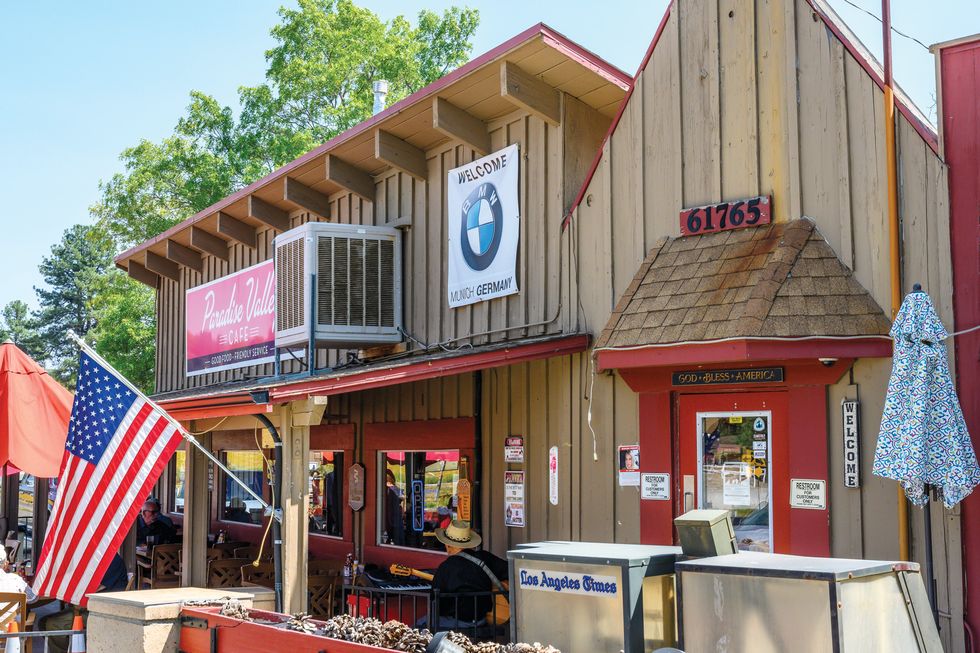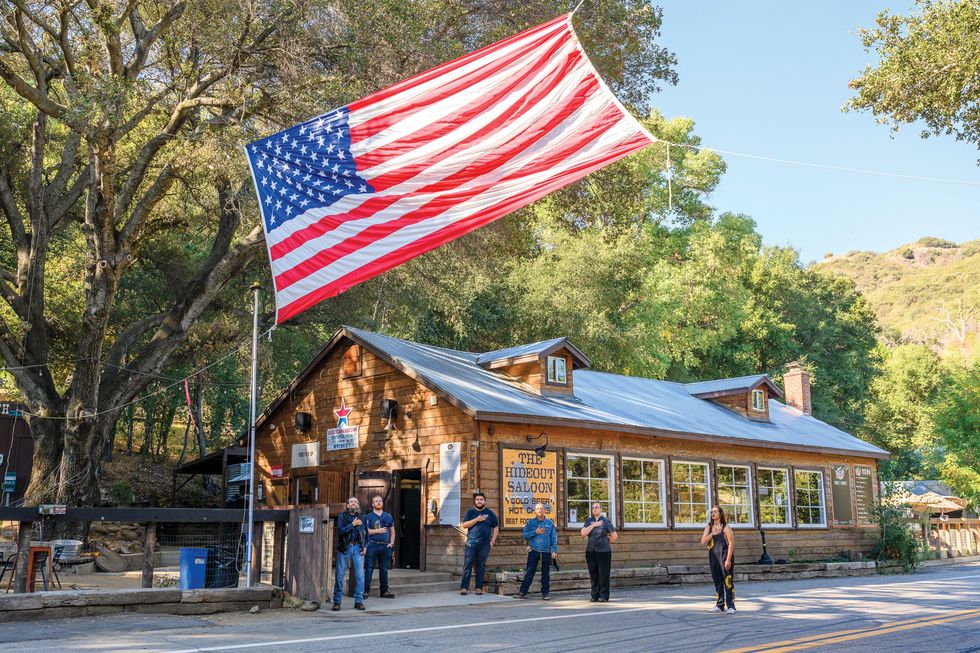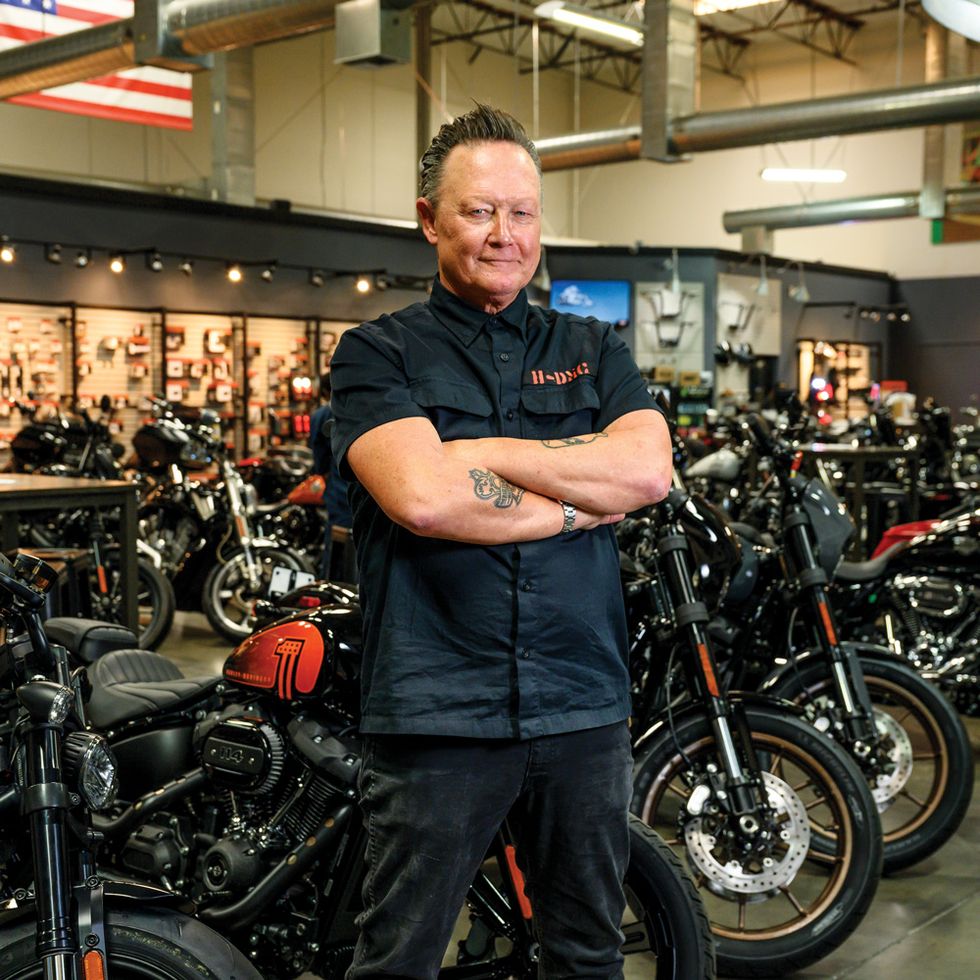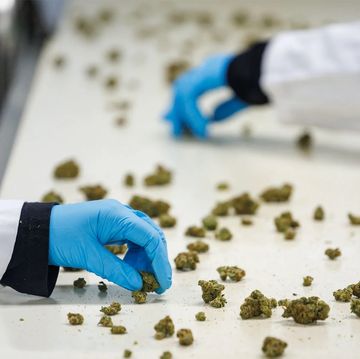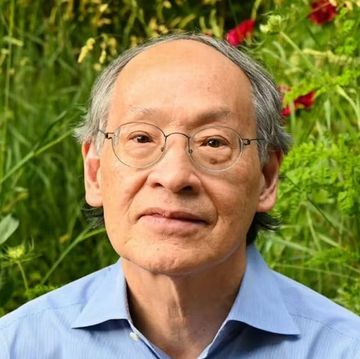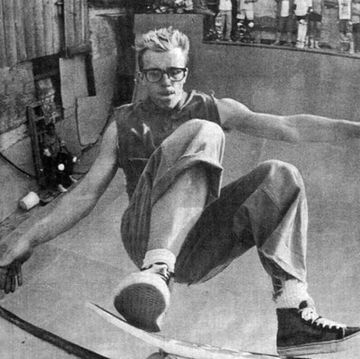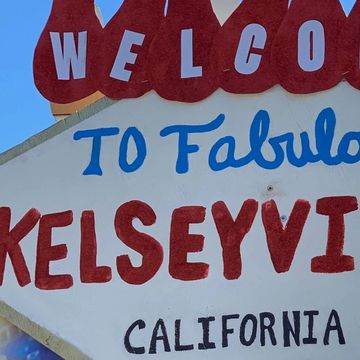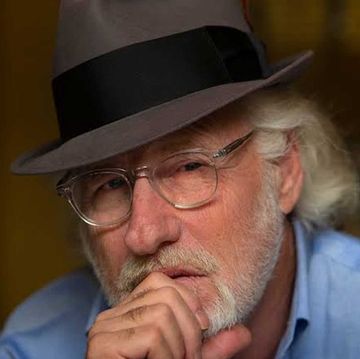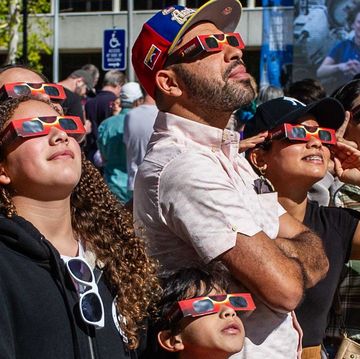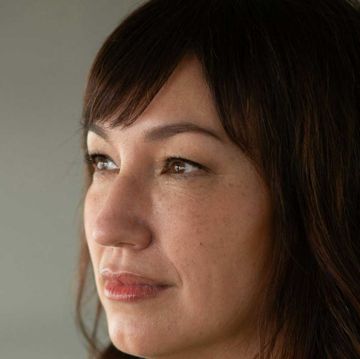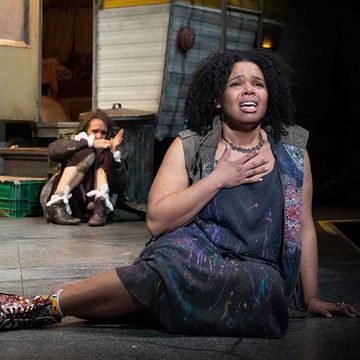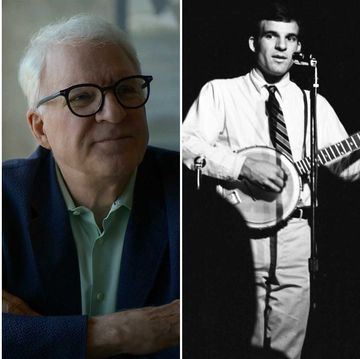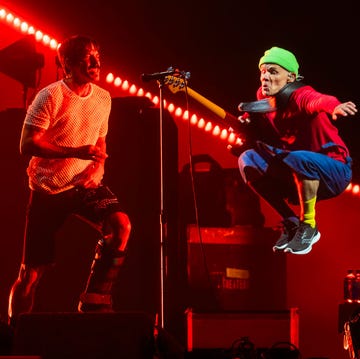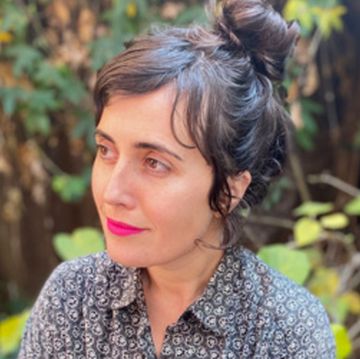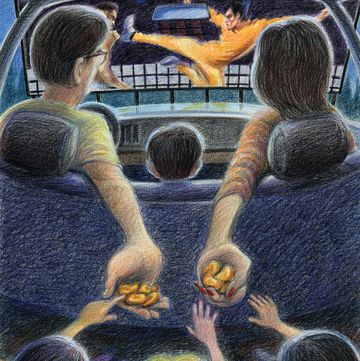Ever since Marlon Brando and a group of thugs invaded the fictional Bleeker’s Cafe and Bar in the 1953 motorcycle film The Wild One, the term “biker bar” has carried a tantalizing whiff of danger.
It’s undeniable that outlaw biker gangs, with reputations for racism, anti-Semitism, and misogyny and members convicted of drug trafficking, money laundering, and murder, remain the very definition of threatening. But plenty of biker bars welcome a cross section of more benign riders. They also provide the unexpected thrill of discovering a funky little outpost with an inviting selection of brews, a stage for weekend musicians, and maybe a pool table or two. And where better to find them than in California’s deserts, where the roads are long, with few traffic lights and stop signs, and the views are stunning.
“There’s a natural brotherhood that starts to happen when you run into another motorcyclist and talk about where you’ve been,” says the actor Robert Patrick, who co-owns a Harley-Davidson dealership in Santa Clarita. Tall and trim, with a rockabilly hairdo, he’s crisscrossed the country 16 times on his bike, most recently riding to and from Butte, Montana, where he filmed the television series 1923 (the new prequel to Yellowstone). For fun, he bikes the twisty byways of the High Desert: “The small towns and little town squares are kind of vacant and gone now. But if you get onto the state roads, you can get inside a community. No disrespect to corporations, but I try to find mom-and-pop-type things.”
Whether you’re riding a chopper or merely out for a Sunday drive in something on four wheels, here are six Southern California biker bars where you can soak up a little bit of history.
THE JOINT
165 Butte Ave., Randsburg
It’s midday, the light blinding in Kern County’s Randsburg, a onetime booming mining camp, population now 45, that sits a mile off Highway 395. Inside the Joint, a musician twangs on an electric guitar in front of a rock fireplace. Dollar bills are pinned to the walls, military flags to the ceiling. Outside, a chalkboard advertises, “Soup of the Day: Whiskey.”
The opera house, saloons, and brothels of early-1900s Randsburg are closed. But the Joint, believed to have been a bakery in that era, draws motorcyclists en route to Lone Pine, Mammoth, Reno, and the eerie Husky Monument, a remote memorial to fallen bikers, some of whom lost their lives on desert highways.
Off-roaders stop in before exploring the El Paso Mountains Wilderness, but it’s street bikers (think smooth tires) who keep the Joint alive year-round, says the bar’s gregarious owner, Neil Shotwell Jr., who has wavy hair and tattoos of good and bad angels on his considerable biceps. “I’ll usually see them Thursday when I open, all happy and go-lucky. Come Sunday, they come back in for one of my Bloody Marys, just beat-up and haggard from the road.”
Shotwell’s prospector grandpa Ray bought the place in 1955, after striking it rich by hitting a tungsten vein. Ray’s teetotaler wife, Olga, ran it (no cursing allowed) until her death, aged 100, in 2012, which left Shotwell and his real estate agent wife, Hollie, the only family members willing to take on the admitted money pit. But Shotwell loves the bar, and he loves Randsburg, with its raucous history, crystalline air, and fiery sunsets.
On the way out of town, heading toward Highway 14, the undulating tarmac dips and falls, holding the breathtaking possibility of an oncoming car or motorcycle cresting a blind rise. But fear cannot be part of riding in the desert, though perhaps it should be. “People get lost, stranded,” says Shotwell, who’s used to a knock on the bar door from a biker asking, “Where am I?”
THE ROCK INN
17539 Elizabeth Lake Rd., Lake Hughes
On a Sunday morning, in the High Desert hamlet of Lake Hughes, in the Sierra Pelona, dozens of shining motorcycles are lined up in front of the Rock Inn, an aptly named nexus for five scenic motorcycle routes. Built in 1929 from local stone, it used to be the Lake Hughes Trading Post: a general store, post office, hotel, gas station, and bus stop.
The late character actor Paul Koslo (The Omega Man, Vanishing Point, Roots), a Lake Hughes resident, took ownership of the place in the mid-1970s and converted the store and post office into a restaurant. Eighteen years ago, he sold the business to Warren St. John, a former chemical mixer for Technicolor.
Inside, the Rock Inn is dark and atmospheric, with wooden booths, a pool table, paintings of western landscapes, a well-stocked bar, and a digital jukebox. Despite all the leather-clad, motorcycle-booted diners ordering early-morning omelets, pancakes, and steak and eggs, St. John, an imposing man with a white Vandyke beard, wire-rimmed glasses, and pride in his own Harley, bristles at the term “biker bar.” He prefers to describe the Rock Inn as a “motorcycle-
enthusiast restaurant and bar.”
“The riders themselves have changed. You’ve got a lot more professional people riding,” he says. “The old-days cliché of biker bars is over.”
CUYAMA BUCKHORN
4923 Primero St., New Cuyama
“It used to be violent here. Lots of fights,” says a local woman who has dropped into the cozy bar at the Cuyama Buckhorn, a retro-cool lodge off Highway 166 in New Cuyama, in Santa Barbara County.
There are no troublemaking bikers here this weekend, though a young woman from Los Angeles wearing a jean jacket with a “Girl Gang” logo is roasting s’mores outside over a fire pit. A motorcycle rider from Bakersfield wears an American-flag tee that proclaims, “If this isn’t your flag then this isn’t your country.” In another corner, a lively group of girlfriends sip cocktails on their way to a dog-rescue fundraiser.
This article appears in Issue 22 of Alta Journal.
SUBSCRIBE
“I’ll get a biker next to a rancher next to a graphic designer from L.A.,” says bartender Sam Seidenberg, who arrived from San Francisco at the start of the pandemic to backpack in the Sespe Wilderness and stayed on in New Cuyama.
Previous owners had turned the 1952 gem, designed by George Vernon Russell—one of the architects who worked on Las Vegas’s Flamingo Hotel—into their idea of what a biker bar should be. They covered up ’50s woodwork to create a space that current co-owner Jeff Vance, founder of iDGroup, a high-end West Hollywood design firm, describes as “Knott’s Berry Farm meets roadside roadhouse.”
Vance remembers being tucked inside his father’s jacket as the pair tooled around Venice on a chopper with straight-across drag bars and a jockey shift that meant his dad had to let go of him when it was time to change gears.
“Today, you’d probably call the authorities. I thought it was the coolest thing in the world,” says Vance, who as a young man riding his own chopper (now he has a Ducati) stopped at the Buckhorn on trips from Kern County’s Pine Mountain Club, where he lived. When he noticed the building was for sale, he and Ferial Sadeghian, his partner and the CEO of iDGroup, pounced, ready to return the place to its original, simple beauty. The restaurant menu now incorporates local greens, eggs, and honey and Wagyu beef from Hanford, in Kings County, and the bar serves wines from the family-run dry-farm vineyard Condor’s Hope.
Modernist-architecture enthusiast and motorcycle collector David Coffey can’t remember how he stumbled onto the Buckhorn, but he fell for its design and became a regular, sometimes riding his BMW bike from Ojai up Highway 33, a national forest scenic byway through the Los Padres National Forest. He passes the brilliant green of wetlands, wild lilac, manzanita and pine trees, and precipitous drops before reaching the desert floor and New Cuyama, wedged between the Sierra Madre and the Caliente Range, which in spring become covered with golden wildflowers.
“It’s the remarkable sensation of the microclimates that you’re riding through,” Coffey says about Highway 33. “In the wintertime, you’re leaving Ojai and it’s 70. By the time you get to the top of the mountain, it’s probably in the 40s. Things smell different. I read that dogs with their head out the window are maybe the only other entity that understands what riding a motorcycle is all about.”
’49ER SALOON
31908 Crown Valley Rd., Acton
On a Saturday in 1972, Jo Anne Darcy, proprietor of what was then called Darcy’s ’49er Saloon in the horsey community of Acton, turned to see a biker bopping a customer over the head with a beer pitcher. Members of the notorious Vagos Motorcycle Club had invaded the place, angry at a local who had refused to sell them gas.
Bullets flew. Knives flashed. Five people landed in the hospital, including a friend of Darcy’s who was kidnapped, stabbed, stripped, and abandoned in the winter chill.
The traumatized Darcy and her husband sold their bar in 1974, and Darcy went on to become the mayor of Santa Clarita. She died in 2017, and that year, with the bar in disrepair, Larry Krask, an actor, and his wife, Cecilia Manst-Krask, a modeling agency owner, bought the business.
The ’49er is said to have started in 1870 as a roadside stand selling hooch to miners. Then–California governor Henry Gage, who owned several gold mines in the area, hosted Teddy Roosevelt, Herbert Hoover, and the king of Spain at the grand, two-story Acton Hotel (now gone), across the street in the small, dusty town. At some point, a saloon that would morph into today’s ’49er went up; its railroad-tie foundation is still visible in the basement of a cottage on the current bar’s lot.
Amid the confusion of history, what is clear is that the ’49er serves friendlier bikers now than in the 1970s. They drop in after rides along rugged Angeles Forest Highway and Aliso Canyon. In November, the saloon’s parking lot swarms with motorcycles that rumble through town as part of the Southern California Norton Owners Club’s annual Hansen Dam Ride, a gathering of classic British motorbikes. In the Christmas season, clubs take a joyride to deliver toys for needy children.
Blond and sunny, Manst-Krask, who found a bullet hole in the foam-upholstered bar during remodeling, tends the new bar top. Bikers, she says, are more likely to down beer than the old-fashioneds and lemon drop martinis she whips up for locals.
The ’49er has shown up as a location for NCIS: Los Angeles and Sons of Anarchy. And after an episode of the BBC TV motorcycle series The Hairy Bikers declared cook Krask’s from-scratch vegan burger to be “superb,” British tourists started making pilgrimages. He also offers bison burgers, wild-game sausage, quail, corn fritters, meatloaf, and jalapeño cheese sticks.
“We have one guy that bikes from Big Bear once a week for a burger,” says Manst-Krask. “People say the food is the ride.”
PARADISE VALLEY CAFÉ
61721 State Highway 74, Mountain Center
Bikers seeking relief from the Palm Desert heat head half an hour up State Route 74, the Palms to Pines Scenic Byway, which bisects the forbidding Santa Rosa and San Jacinto mountain ranges. Irresistible to speed demons unafraid to tackle its hairpin turns, it’s one of the most alluring—and dangerous—thoroughfares in Southern California.
At a crossroads in Mountain Center, population 66, are the rewards for a jitters-inducing trip: air that can be 20 degrees cooler than on the desert floor and the rustic Paradise Valley Café, whose bar stocks 40 international beers, sparkling guava fruit drink and ginger beer from Australia, and, the place claims, the only malbec in the area.
The original 1939 Paradise owner was a six-shooter-carrying character nicknamed Pistol Annie. “I’m the seventh owner in 27 years and the only one who hasn’t gone bankrupt,” brags Neel Joshi, a substantially built former Los Angeles restaurateur. He bought Paradise in 2010 and turned it into a magnet for motorcycle riders as well as sports car drivers.
On the patio, with its view of mountain greenery, a group of white-haired CEO types, who have arrived on Harleys and BMWs, huddle under a red umbrella to discuss investments over their burgers. At another table, Italian tourists order baby back ribs that Joshi imports from Denmark.
International car and motorcycle companies, including Harley-Davidson, BMW, Ferrari, Aston Martin, Porsche, and Ducati, hold corporate events here, drawn to the serpentine highway. They leave their marks with recipes they create for the bar’s menu: the BMW burger is served on a Bavarian-pretzel bun; the Harley-Davidson comes with Ortega chile and habanero Jack; the Ducati sandwich includes pepperoni, Black Forest ham, and pesto, served on a French roll.
Bikers keep coming until it snows, including, occasionally, members of the Hells Angels, Mongols, and Vagos outlaw clubs. “We have a list of the biggest assholes. Even before they come into the restaurant, just looking at them, we know they’re going to have an attitude,” says Joshi. “They are Cadillac drivers; BMWs, always the 3 Series; and entry-level Lexus.” As for the bikers, Joshi says they “are actually the nicest people I’ve ever come across.”
JOSIE’S HIDEOUT SALOON
27413 State Route 76, Santa Ysabel
In San Diego’s glorious backcountry, curving Highway 79, once a part of the Butterfield Overland Stage Route, leads past oak groves, horse farms, and fields of munching cows. At the intersection with Highway 76, a sharp turn reveals another world at Josie’s Hideout Saloon, a barnlike structure that sits on roughly 50 acres in the middle of the woods.
Visitors can order burgers, Cubanos, hot dogs on poppy seed buns, and Meyer lemon cheesecake. There’s beer on tap from Nickel Beer Company in nearby Julian as well as margaritas and whiskey sours. On a recent Saturday, the Not All Dead, a Grateful Dead cover band, played on an outdoor stage against an American-flag backdrop.
“You’re coming to my front porch,” manager Amber Jones says, adding that everyone is welcome here, from motorcycle clubs to kids and dogs. “You can show up in a pink tutu if you want. We’re neutral territory.”
A onetime grocery store, the Hideout was for a long stretch a popular biker dive bar that in one iteration hosted wet T-shirt contests, according to regular guest John J. Shoemaker, a 77-year-old retired construction worker. Eventually, it sat vacant and neglected, until San Diego contractor Mike Haaland bought it and spent a year sandblasting two decades of paint and exposing impressive beams beneath the drywall ceiling. He’d arrive at work and find 100 motorcyclists wanting to know when the place would reopen. “If I hadn’t kept it a biker bar, I think there would have been riots,” he says.
It reopened in 2019, on 9/11, to become a destination bar that draws motorcyclists from desert communities, Orange County, and the coast. Several times a week, Shoemaker hops onto his Harley or into his Mini Cooper and drives from Borrego Springs to the Hideout.
“Southern California, I think from Los Angeles down, has got an amazing road warrior vibe,” he says, barely able to contain his enthusiasm for the Hideout. “It’s all about Americana—a little music, looking at the motorcycles. The camaraderie with the people. It’s nothing but a positive ambience. American freedom at its finest.”
“We’re very patriotic,” agrees Jones.
Indeed, bikers who arrive at opening time can stand, hand over heart, to join employees in singing the national anthem.•
Louise Farr is based in Los Angeles, where she’s a contributing editor for the Writers Guild of America West magazine. She's the author of the true crime book The Sunset Murders.
